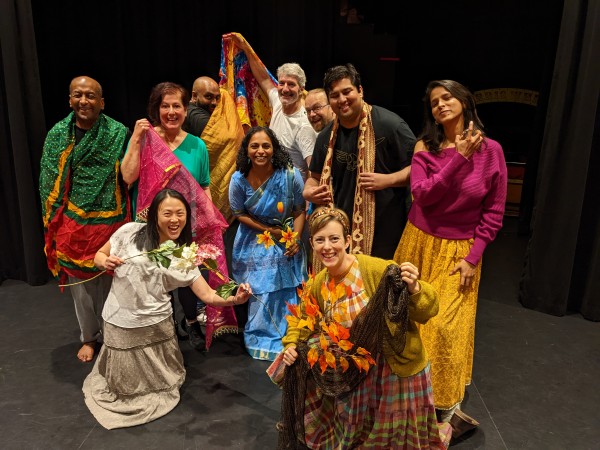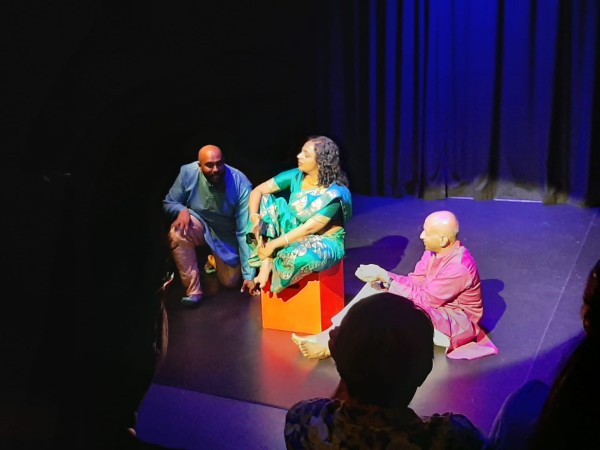The Auckland improvisation theatre scene has been growing in recent years. Dr Anita Perkins interviewed two improvisors from Asian migrant backgrounds, Yoong Ru Heng and Ambika GKR both part of this unique performance art form. They talk about their experiences with improv, and how Asian identities are being reflected in Auckland improv shows.
Improvisation theatre, or ‘improv’ for short, is a way of creating a theatre show in the moment without a script.
For Yoong Ru Heng, who identifies as Malaysian Chinese and a New Zealander, getting into improv in 2019 was initially part of her workplace professional development.
She found that doing a beginner’s improv course provided her with useful professional skills, such as speaking with confidence when put on the spot at work meetings. Improv became a personal hobby for Yoong helping her get out of her head, be present, connect with diverse communities and laugh a lot.
Another star of the Auckland improv scene, Ambika GKR (her stage name), had a different journey into improv. Ambika was born in India with Tamil and Kiwi culture and the experience of living in Zambia and Australia forming parts of her identity.
Back in 2015 Ambika was a stay at home parent to her children, then aged 2 and 4. She longed for a creative space to express herself as an individual. Ambika explains, “Improv class was like two hours a week where I wasn't a mum, and I wasn't a wife, and I wasn't a daughter. It was nice to just go and be myself for a few hours a week. I just got hooked.”
In late 2022, Ambika and Yoong produced and performed in an improv show together called ‘Improv Masala’ at the Covert Theatre. The format of the show was inspired by Bollywood movies, dance and music, and included a multicultural cast. Ambika says the show became “an in-between space” where she could express the multiple elements of her identify. “When my parents immigrated to New Zealand they stayed well within the Indian or the Sri Lankan Tamil community because that's where they felt accepted and safe, whereas for my brother and I, because we came at quite a young age, we felt like we are genuinely half kiwi and half Indian.
But there's not a space for that. I needed a place where I could blend it all together. I felt like that's what I was able to do with that show.”

"Improv Masala" cast / image supplied
Yoong agrees with Ambika. She found that cast members of ‘Improv Masala’ drew spontaneously on cultural family experiences in their performances. Yoong explains, “Improv is spontaneous and in the moment and it's a genuine reaction, or close to a genuine reaction through the character you portray.
Cast members were all of a sudden thinking about their grandma or the experiences of family members. That was what came through. You end up forming some of these connections for yourself.”
While the involvement of Asian communities in improv is growing, Ambika and Yoong would like to see more representation. In 2023, Yoong was part of the cast of a scripted theatre piece called ‘How to Throw a Chinese Funeral’ which she refers to as “very much a Malaysian Chinese story.” She would like to see more Asian stories and experiences reflected through improv.
After 9 years as an improvisor, Ambika is passing on her improv skills by teaching improv to beginners at Covert Theatre. She is also involved in the theatre's Ethnic Minority space initiated by Matías Avaca. “I'm hoping that will lead into bringing other communities into improv”, she says. Both improvisors point out that improv is a mostly Western art form, which may be a barrier to Asian performers. However, they would also be interested in researching possible origins of improvisation theatre in Asian countries.
When asked about representing Asian cultural identities on the improv stage Yoong and Ambika said they feel strongly that stereotyping should be avoided. Ambika explains, “I wouldn't want people to do an Indian accent for example, unless they know the languages well enough to know the difference between the regional variations of an Indian accent. A Tamil accent is very different from a Gujrati or Bengali accent.” Yoong points out there is a difference between stereotyping and drawing on tropes. “A stereotype is where it gets hurtful. A stereotype would be consistently going for the dairy owner.
In any kind of narrative or storytelling we understand the tropes. A trope could be to do with family dynamics such as between a mother and her offspring who are struggling to do what they want.”

"Improv Masala" in performance/ image supplied
Ambika loves the way in which diverse audiences react to diverse improv performers. Certain parts of an improv performance will resonate with audience members of different cultures. She says, “sometimes there's layers of jokes that you bring when you've got different backgrounds, and the audience is also representative of that.”
Ambika recalls her experience of different audience reactions at an improv comedy battle with contestants from different countries. “That was fascinating. You'd have jokes that only the Spanish or only the Latin Americans got, or only the Chinese got, or only the English. It was so joyful.”
In a similar way, Yoong finds joy in the way improv is a space to explore the diversity within Chinese diaspora in New Zealand. “When I do the Malaysian accent, it lets me ground the character in a particular viewpoint and experience. This is important for me because there's a big Chinese diaspora.
There are also lots of Chinese from Vietnam, Hong Kong, Taiwan, Indonesia, etc. You might be from Asia and Chinese, but you're not immediately from China. Within the large and diverse Asian migrant grouping, you're a bit more in-between.
There's so much to explore in those experiences.”
Ambika and Yoong’s recommendations for upcoming improv and theatre in Auckland:
- Auckland Improv Festival, 13 – 20 April aucklandimprovfestival.com
- Beam me up improv show, 26 and 27 April https://www.eventfinda.co.nz/2024/beam-me-up/auckland/ponsonby
- Asian Comedy Takeover, 11 May https://www.comedyfestival.co.nz/find-a-show/the-asian-comedy-takeover/
- A Mixed Tape for Maladies, scripted show, 19 Nov – 2 December https://www.atc.co.nz/auckland-theatre-company/2024/a-mixtape-for-maladies/
- Asia Media Centre